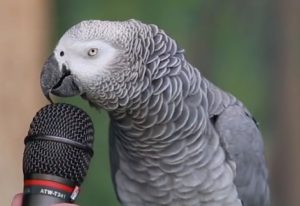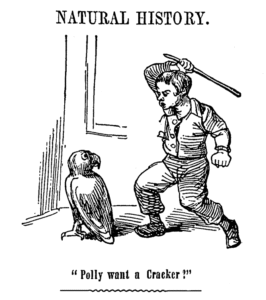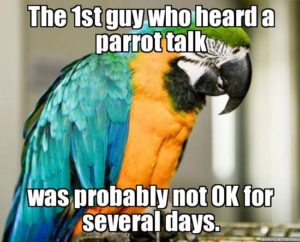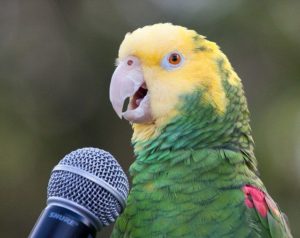Quality Hand-Fed Avian Companions
“I Want a Bird That Talks”
 We have lost count of the number of messages or phone calls we’ve received over the years from someone asking for a bird that can talk.
We have lost count of the number of messages or phone calls we’ve received over the years from someone asking for a bird that can talk.
Usually it’s someone who has seen videos of a bird like Einstein the famous African grey (video) with a vocabulary of over 200 words and an uncanny ability for impersonations. Or maybe they’ve seen the amazing lyrebird (video) native to Australia that has begun perfectly mimicking mechanical sounds like camera shutters as human tourism encroaches on their habitat.
There was even a news story about a British parrot owner who lost his bird, only for it to return four years later speaking Spanish! Talking birds are all the rage. way, there’s something intriguing about an animal that performs what we usually think of as human actions. Regardless of where they got the idea that they want one, there’s something undeniably intriguing about an animal performing what we usually think of as human actions.
 The common cliché of a talking bird is such a part of culture that it’s almost an expectation, especially “those pirate parrots.” That notion has been around for a while. In fact, “Polly want a cracker” goes back to the mid 1800s in the book Treasure Island and was used as a popular slogan by the National Biscuit Company (Nabisco) even before that. (Here’s an interesting history of where the phrase came from.)
The common cliché of a talking bird is such a part of culture that it’s almost an expectation, especially “those pirate parrots.” That notion has been around for a while. In fact, “Polly want a cracker” goes back to the mid 1800s in the book Treasure Island and was used as a popular slogan by the National Biscuit Company (Nabisco) even before that. (Here’s an interesting history of where the phrase came from.)
So it seems fairly natural that people would ask for a talking parrot, particularly when they don’t have a lot of experience with exotic birds. We really can’t blame them, and part of our mission at West Branch Aviary is to help educate the public on things we often take for granted.
The reality is that looking for a bird that will talk is never a good motive. Birds are just like children, each one has their own unique personality. Some are more outgoing, some are shy. Even with a species typically known for their vocal abilities, you can still find a bird that never utters a word. Other times, you might be pleasantly surprised when a bird that typically doesn’t speak at all starts uttering recognizable words. After all, the world record of of a 1,700 word vocabulary is held by a common Budgie.

Their environment and the atmosphere they are raised in can also play a large factor. Some birds will only talk to certain people or under certain circumstances. Some prefer to be the most vocal when the house is quiet and you’re trying to get the kids to nap! Even ones who don’t talk will often still make chattering noises in the evening as they wind down before bed.
Some birds may never speak discernible words at all, but enjoy whistling, and mimicking some of its favorite sounds. We have an African grey who will make burb and fart noises, and copy the microwave beeps when we are heating up leftovers. Our white bellied caique especially likes to trick us into thinking the smoke detector battery is low. Once they hear a sound that gets a reaction out of you, they’re unlikely to give it up!
 The bottom line is that trying to choose a bird specifically wanting it to talk not a good criteria for selecting a pet. It’s not something you can predict in a baby bird, and we’ve often been surprised by which ones actually do end up the most vocal. By having your heart set on a bird’s speech ability as the most important factor in your choice, you can easily overlook other excellent traits and compatibility, or be left feeling disappointed with an otherwise great companion.
The bottom line is that trying to choose a bird specifically wanting it to talk not a good criteria for selecting a pet. It’s not something you can predict in a baby bird, and we’ve often been surprised by which ones actually do end up the most vocal. By having your heart set on a bird’s speech ability as the most important factor in your choice, you can easily overlook other excellent traits and compatibility, or be left feeling disappointed with an otherwise great companion.
Thankfully, we’re really good at playing matchmaker and finding our clients the right bird with the temperament that best fits you and your situation. The most important thing is to appreciate your bird for its own unique personality, instead of whether or not it talks.
